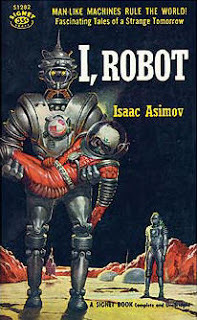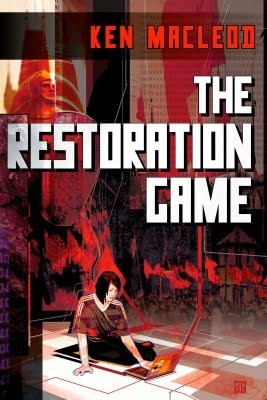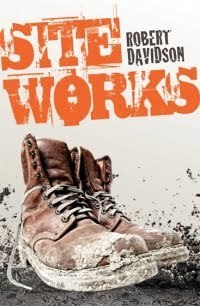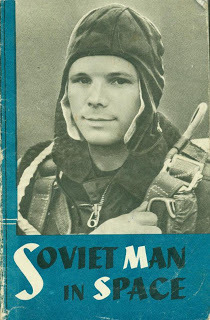Ken MacLeod's Blog, page 24
May 28, 2011
'I, Robot.' You what?

So I'm doing an after-dinner talk about robots and AI in SF for SICSA's PhD student conference and by way of introduction I say something that I only thought of that afternoon.
Which is that as an SF writer I sometimes get asked to speak at events like this, relating SF to the actual practice of a discipline, and that it's just occurred to me that in every case SF owes that field an apology for getting it wrong. Take surveillance studies, for instance: we gave them Nineteen Eighty-Four, which is all about real-time surveillance rather than the accumulation and storage of records. This has people worked up about surveillance cameras and quite blasé about Google (etc) tracking their every move.
Or take genomics, an area in which I've been quite involved, and the technologies associated with it: genetic engineering and genetic medicine. The SF template for these has been provided by Brave New World and Frankenstein. What these works have spawned, regardless of the intent of their creators, is a great lumbering monster of reactionary anxieties.
And robotics, computer science, and AI? Yup, we did it again, from Čapek onwards (not to mention Mary Shelley's creature). And even when Eano Binder and Isaac Asimov had taken a hammer to the Revolt of the Robots cliché, almost all SF about robots and AI has dealt not with likely consequences but about, well, us: distinctively human-centred themes of labour, slavery, consciousness, identity; and the anxieties provoked when we see, or imagine, these replicated in a machine.
And then I went on to give my talk about how SF has dealt with these.
What I wonder, though, thinking about this, is whether there's any area of human endeavour or inquiry which has featured largely in SF, and that SF has handled in a way that hasn't been an utterly cringe-making travesty of what it's actually about.
Suggestions welcome.
Published on May 28, 2011 13:16
May 25, 2011
The Restoration Game in US paperback, real soon now
 The US edition of my novel The Restoration Game, to be published by Pyr in September, is now available for pre-order on Amazon.com. It has a really cool cover by Stephan Martinière, who here as elsewhere has an uncanny talent for taking scenes from my imagination and rendering them more vividly and accurately than my own mind's eye.
The US edition of my novel The Restoration Game, to be published by Pyr in September, is now available for pre-order on Amazon.com. It has a really cool cover by Stephan Martinière, who here as elsewhere has an uncanny talent for taking scenes from my imagination and rendering them more vividly and accurately than my own mind's eye.
Published on May 25, 2011 16:12
The Restoration Game in US paperback, real soon now

The US edition of my novel The Restoration Game, to be published by Pyr in September, is now available for pre-order on Amazon.com. It has a really cool cover by Stephan Martinière, who here as elsewhere has an uncanny talent for taking scenes from my imaginination and rendering them more vividly and accurately than my own mind's eye.
Published on May 25, 2011 16:12
Flashback
 Ian Hocking's Flashback, the sequel to his recently-published Déja Vu (see below) is now available from the Amazon Kindle Store. I haven't read it yet but it looks intriguing. And with the promise of more Saskia Brandt stories to come, Ian risks becoming a writer again, which is good news all round.
Ian Hocking's Flashback, the sequel to his recently-published Déja Vu (see below) is now available from the Amazon Kindle Store. I haven't read it yet but it looks intriguing. And with the promise of more Saskia Brandt stories to come, Ian risks becoming a writer again, which is good news all round.
Published on May 25, 2011 15:57
Flashback

Ian Hocking's Flashback, the sequel to his recently-published Déja Vu (see below) is now available from the Amazon Kindle Store. I haven't read it yet but it looks intriguing. And with the promise of more Saskia Brandt stories to come, Ian risks becoming a writer again, which is good news all round.
Published on May 25, 2011 15:57
May 3, 2011
38 years of unintended consequences
In 1973 an Afghan politician called Daoud overthrew his cousin, the king, and proclaimed a republic. In this he had the help of the moderate faction of Afghanistan's communist party, the PDPA, led by Babrak Karmal. The PDPA's base was the large part of Afghanistan's small technical intelligentsia that had been to university in the Soviet Union and seen the future in the bright lights of Tashkent. Under the republic the party reunited and grew somewhat stronger. President Daoud decided in late April 1978 to crush it. Unfortunately for him, the PDPA had enough cadres in the army's officer corps to improvise a coup, and it was Daoud who got crushed. The coup was welcomed by joyous crowds in Kabul, making it the Saur (Spring) Revolution. The revolutionaries set out to reform Afghanistan's feudal countryside, but managed to alienate the peasants, to say nothing of the landlords and mullahs. Faced with increasingly violent opposition, the revolutionaries split along old factional lines between moderates and radicals. The president, Taraki, gave the moderate leader, Karmal, the job of ambassador to Czecheslovakia. Taraki then flew to Moscow, consulted with Brezhnev, and returned with the intention of dealing with the radical leader, Amin. Amin shot Taraki first, and pressed on in the teeth of an escalating insurgency, appealing all the while for Soviet military aid. The US, seeing opportunity, began arming the Afghan counter-revolutionaries. In December 1979 the Soviet Union answered Amin's appeals for aid by moving in troops to stabilise the situation, killing Amin, and installing Karmal.The US, Pakistan, and Saudi Arabia then massively stepped up their aid to the counter-revolutionaries, and organised the flow of thousands of Muslim militants to Afghanistan. One of these militants was a young civil engineer called Osama Bin Laden. One of his former colleagues said Osama was popular with the mujahadin because of his money and his construction skills, adding almost as an afterthought: 'And of course his pleasant personality!'The cascade of unintended consequences just keeps rolling along. There seems no reason to think it will now stop.
Published on May 03, 2011 10:42
38 years of unintended consequences
In 1973 an Afghan politician called Daoud overthrew his cousin, the king, and proclaimed a republic. In this he had the help of the moderate faction of Afghanistan's communist party, the PDPA, led by Babrak Karmal. The PDPA's base was the large part of Afghanistan's small technical intelligentsia that had been to university in the Soviet Union and seen the future in the bright lights of Tashkent. Under the republic the party reunited and grew somewhat stronger. President Daoud decided in late April 1978 to crush it. Unfortunately for him, the PDPA had enough cadres in the army's officer corps to improvise a coup, and it was Daoud who got crushed. The coup was welcomed by joyous crowds in Kabul, making it the Saur (Spring) Revolution. The revolutionaries set out to reform Afghanistan's feudal countryside, but managed to alienate the peasants, to say nothing of the landlords and mullahs. Faced with increasingly violent opposition, the revolutionaries split along old factional lines between moderates and radicals. The president, Taraki, gave the moderate leader, Karmal, the job of ambassador to Czecheslovakia. Taraki then flew to Moscow, consulted with Brezhnev, and returned with the intention of dealing with the radical leader, Amin. Amin shot Taraki first, and pressed on in the teeth of an escalating insurgency, appealing all the while for Soviet military aid. The US, seeing opportunity, began arming the Afghan counter-revolutionaries. In December 1979 the Soviet Union answered Amin's appeals for aid by moving in troops to stabilise the situation, killing Amin, and installing Karmal.
The US, Pakistan, and Saudi Arabia then massively stepped up their aid to the counter-revolutionaries, and organised the flow of thousands of Muslim militants to Afghanistan. One of these militants was a young civil engineer called Osama Bin Laden. One of his former colleagues said Osama was popular with the mujahadin because of his money and his construction skills, adding almost as an afterthought: 'And of course his pleasant personality!'
The cascade of unintended consequences just keeps rolling along. There seems no reason to think it will now stop.
The US, Pakistan, and Saudi Arabia then massively stepped up their aid to the counter-revolutionaries, and organised the flow of thousands of Muslim militants to Afghanistan. One of these militants was a young civil engineer called Osama Bin Laden. One of his former colleagues said Osama was popular with the mujahadin because of his money and his construction skills, adding almost as an afterthought: 'And of course his pleasant personality!'
The cascade of unintended consequences just keeps rolling along. There seems no reason to think it will now stop.
Published on May 03, 2011 10:42
April 25, 2011
Site Works launch at Blackwell's

On Thursday 28 April at 6.30 I'll be talking with Robert Davidson, editor of Sandstone Press at a book launch event at Blackwell's in Edinburgh for his new novel, Site Works. Bob has drawn on his own experience as a civil engineer in the water industry to write this intense look into the lives of men whose hard work makes our lives liveable, yet who we usually see as indistinguishable figures knee-deep in mud.
On a wind lashed coast in the far north a group of men assemble on a construction site. The Ness and Struie Drainage Project will dominate their lives for the next few months as they toil through the daylight hours and into the night, endure hardship and conflict and – mostly - survive. Within the compound and fencelines a new, temporary world will form, bounded by sea, mountains and sky. Site Works is the story of the men and their work, transients creating something permanent and greater than they know.I'm reading this book right now and thoroughly enjoying it.
Published on April 25, 2011 19:33
April 13, 2011
Fiction to Future: The Science of Science Fiction
Tomorrow evening (Thursday 14 April) at 7 p.m. I'll be at this Science Festival event at the Pleasance, with Iain M. Banks and Charles Stross, chaired by Andrew J. Wilson. Tickets are £3, available from the site, over the counter at Blackwell's (which is sponsoring the event), and on the door.
I should add that at 6 p.m. there's a science fiction poetry event at the Scottish Poetry Library, which is, um, about ten minutes' very fast and mostly uphill walk to the Pleasance, so if you're young and/or fit and fancy both events, well ... Tickets for this one are £5/£3 and available from the Library.
Speaking of science and poetry, the SPL has a podcast (here and here) of interviews on the subject conducted by its Reader in Residence, Ryan Van Winkle, with me and with Tracey S. Rosenberg. (Tracey makes a much livelier job of it than I did.)
I should add that at 6 p.m. there's a science fiction poetry event at the Scottish Poetry Library, which is, um, about ten minutes' very fast and mostly uphill walk to the Pleasance, so if you're young and/or fit and fancy both events, well ... Tickets for this one are £5/£3 and available from the Library.
Speaking of science and poetry, the SPL has a podcast (here and here) of interviews on the subject conducted by its Reader in Residence, Ryan Van Winkle, with me and with Tracey S. Rosenberg. (Tracey makes a much livelier job of it than I did.)
Published on April 13, 2011 19:14
April 12, 2011
Yuri's Night
 Fifty years ago today, the working class began the conquest of space. Whatever else may be said by way of criticism of that remarkable section of society, this achievement is forever theirs.
Fifty years ago today, the working class began the conquest of space. Whatever else may be said by way of criticism of that remarkable section of society, this achievement is forever theirs.Yuri Gagarin's flight is being celebrated around the world, and even off it. Glory to Yuri, and to all who followed - and to all who will, a number that will some day be millions, and that will still be the beginning.
[Image source: Museum Victoria]
Published on April 12, 2011 21:03
Ken MacLeod's Blog
- Ken MacLeod's profile
- 762 followers
Ken MacLeod isn't a Goodreads Author
(yet),
but they
do have a blog,
so here are some recent posts imported from
their feed.



